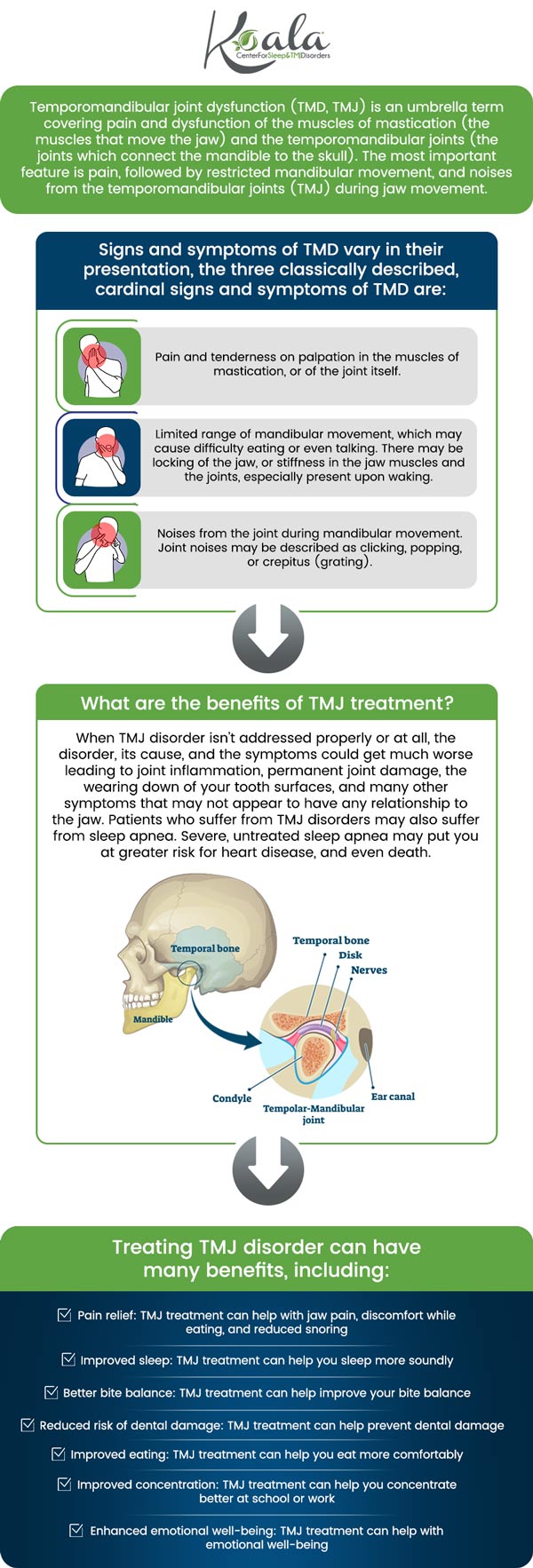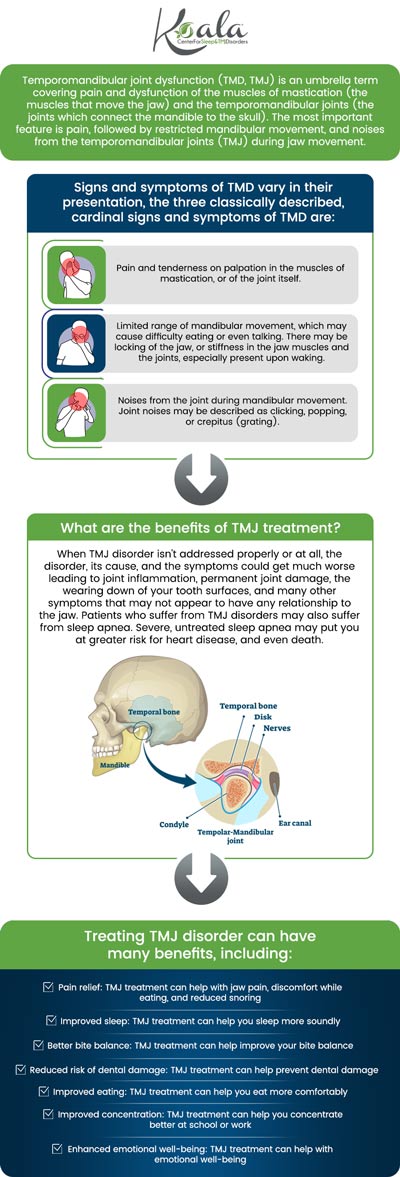TMJ Disorders & Sleep: Everything You Need to Know
Do you have TMJ and is it affecting your sleep? according to research 50% of TMJ patients have sleeping problems. If you are also one of these, then visit Koala® Center For Sleep & TMJ Disorders and get comprehensive treatment. For more information, contact us or visit us online to book an appointment. We have convenient locations across the U.S. in Bloomington IL, Peoria/Dunlap IL, El Paso TX, and Wausau WI.




Table of Contents:
Can TMJ cause insomnia?
Will lack of sleep make my TMJ worse?
Can TMJ be psychosomatic?
How can I get a good night’s sleep with TMJ?
Temporomandibular joint disorder (TMJ disorder) is a complex disorder of the temporomandibular joint (TMJ), which connects the lower jaw and the skull. TMJ disorder can cause a variety of symptoms, such as pain, difficulty in opening and closing the mouth, a clicking or popping sound when the joint moves, headaches, and a limited range of motion. The exact cause of TMJ disorder is unknown, but it is believed to be a result of a combination of factors such as trauma, inflammation, jaw misalignment, and stress. Treatment for TMJ disorder can include medications, physical therapy, lifestyle changes, or surgery.
Yes, TMJ disorder can cause insomnia. While TMJ disorder and insomnia are two different conditions, insomnia can be caused by TMJ disorder if it causes pain at night. The temporomandibular joint may be painful at night from putting pressure on your jaw as you rest your head. This can interfere with quality of sleep.
Yes, lack of sleep can make TMJ disorder worse, leading to increased stress levels, more inflammation, and more pain. There are few situations where lack of sleep will not worsen; this is because sleep is essential for our most basic functions and without it, our bodies cannot heal properly. Getting enough quality and restful sleep each night can help improve your TMJ disorder, but if your jaw has been causing you problems for a while, you will likely need professional treatment in order to find relief.
Yes, TMJ disorder can certainly be psychosomatic. Psychosomatic refers to the relationship and interaction between the mind and body, and how our thoughts, beliefs and emotions can influence our physical health and overall condition. For example, if you are constantly focusing on your TMJ, thinking about how much it hurts, how annoying the popping or clicking sound is every time you open your jaw, or how much of an inconvenience your TMJ is, it will absolutely have more of an impact on your day-to-day life and be experienced as much worse. However, if you have a positive mindset and outlook on your condition, it is much more likely to cause fewer problems, and/or resolve over time, especially with the appropriate treatment. This is because harboring negative thoughts and feelings initiates a stressful or anxious response in the body. In turn, the body experiences increased cortisol levels and restricted blood flow; when blood flow is restricted, the body cannot heal properly.
When you are living with TMJ disorder, it can be stressful thinking about how you can manage its symptoms to get a good night’s rest. This is not a good situation to be in and can be avoided by addressing the underlying cause of TMJ disorder. While this will help you overall, it will not do much if you are lying in bed, struggling to fall asleep because of your jaw pain. For some immediate relief of TMJ pain, try placing a hot/cold compress on the affected side of the jaw. You can also try some gentle stretches, although you must be careful with this as over-stretching your jaw could exacerbate symptoms. Also, taking an over-the-counter anti-inflammatory drug can help to reduce swelling and pain long enough for you to get to sleep.
Koala® Center For Sleep & TMJ Disorders is dedicated to providing you with all of your TMJ disorder-related needs. We serve patients from all across the United States, and currently have seven locations, including: one in El Paso, TX; one in Wausau, WI; one in Mishawaka, IN; one in Peoria – Dunlap, IL; and one in Bloomington, IL. Schedule an appointment with an experienced TMJ disorder specialist at any of our locations today to receive top-level care! We look forward to serving you!

Additional Services You May Need
▸ KoalaKIDZzz®
▸ Sleep Apnea
▸ Snoring
▸ TMJ Disorder
▸ Fatigue
▸ Sleep Disorders
▸ Weight Loss
▸ CPAP Alternative
▸ Oral Appliances




